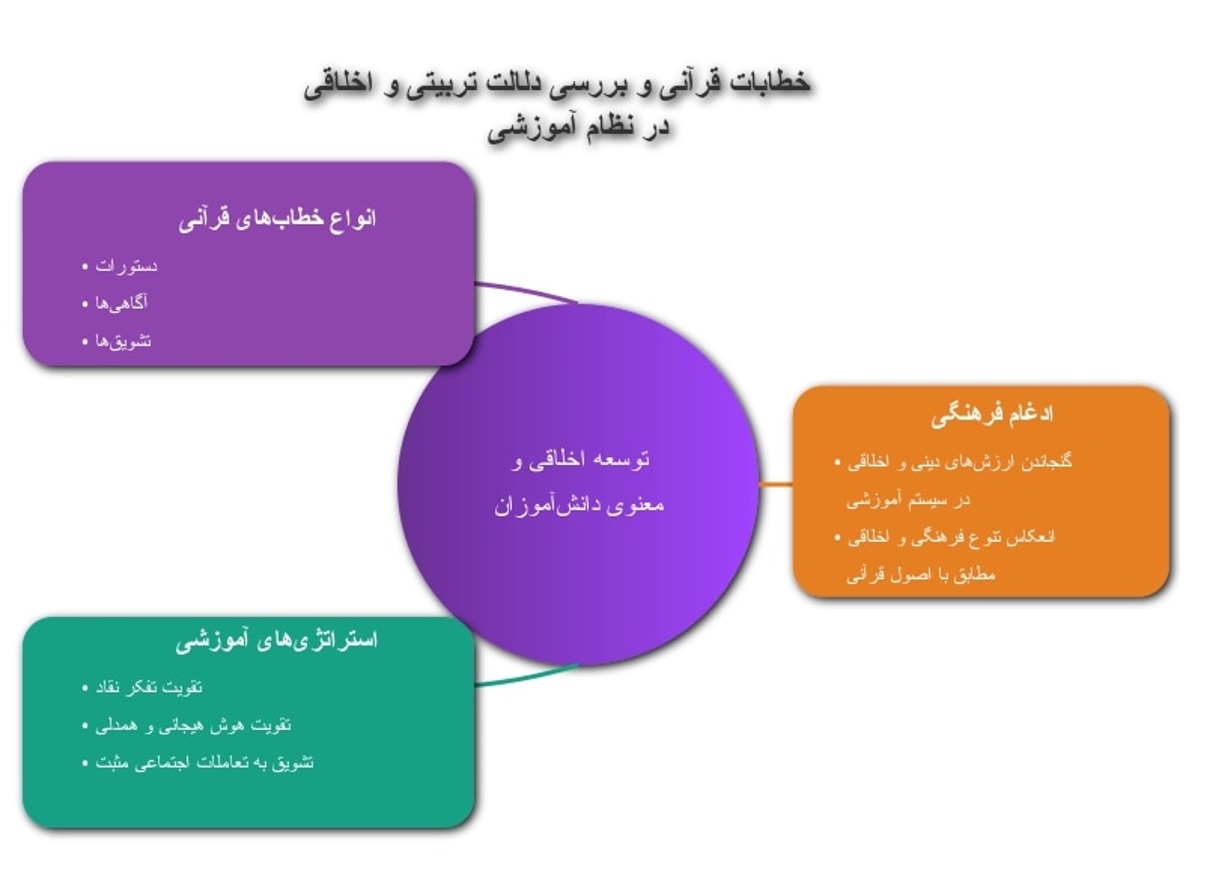Analysis of Quranic Addresses and Examination of Their Educational Implications in the Educational System
Keywords:
Quranic Addresses, Educational Implications, Educational System, Content AnalysisAbstract
Quranic addresses are among the core components of religious and Quranic culture that significantly impact the process of individual and social upbringing. With contemplation in the Holy Quran, every verse that includes an address encompasses wisdom that can be analyzed. These addresses cover diverse dimensions, including attention to the psychological, social, and spiritual needs of individuals, which can be utilized to enhance the educational system. The aim of this research is to analyze the educational implications of Quranic addresses and to examine how they can be utilized within the educational system to improve the quality of student upbringing. This study employs a descriptive-analytical approach, utilizing library research tools and qualitative content analysis to identify and analyze the educational implications embedded within Quranic addresses by reviewing secondary sources. The results indicate that Quranic addresses contain themes such as encouragement of reflection and reasoning, emphasis on justice and fairness, invitation to self-awareness and recognition of God, and the importance of healthy and constructive social relationships. These implications can serve as foundational principles in designing educational and upbringing programs in schools. Utilizing the educational implications of Quranic addresses can enhance students' intellectual and ethical skills and foster an effective upbringing culture within the educational system. Therefore, it is recommended that curriculum design pays greater attention to these implications, and special training courses for teachers be organized to equip them with the skills to implement these teachings.
Downloads
References
Collection of Speeches by the Supreme Leader.
Mo'in M. Mo'in Persian Dictionary. Tehran: Amir Kabir Publications; 1985.
Dehkhoda AA. Dehkhoda Dictionary and Persian Lexicon. Tehran: Tehran University Publishing Institute; 1994.
Zabidi MMMiYqF. Taj al-Arus min Jawahir al-Qamus (The Crown of the Bride from the Jewels of the Dictionary).
Beirut1800.
Ibn Manzur MiM. Lisān al-ʿArab (The Tongue of the Arabs). Beirut: Dar Ihya' al-Turath al-Arabi; 1801.
Ragheb Isfahani Aa-QHbM. Mufradat Alfaz al-Quran (The Vocabulary of the Quran). Tehran: Nasr-e Khusraw
Publications; 1984.
Mostafavi H. Al-Tahqiq fi Kalimat al-Quran al-Karim. Translated and summarized by Sadegh Abbasi ed. Tehran:
Ministry of Culture and Islamic Guidance; 2020.
Ghasemi MJ. Discourse and Address Culture in the Holy Quran. Isfahan: Adab-e Emrooz; 2010.
Al-Amoush K. Al-Khitab al-Qurani (The Quranic Discourse). Jordan: Modern World of Books, Al-Amoush; 2005.
Ghazi Askar S. Analysis of the Addresses 'O You Who Have Believed' in the Holy Quran with Emphasis on Social
Teachings: Alzahra University; 2017.
Shahsavandi S, Khanehzad O. Linguistics of Address in the Quran. Quarterly Journal of Quranic Research.
;18(2):82-98.
Najafi A. Explaining the Foundations of Address Recognition in the Holy Quran and Its Educational Implications in
Relation to Students and Teachers. Tehran: Allameh Tabataba'i University; 2021.
Sohani A, Amiri Qaemi A, Vakili N, Ahangaran K. Explaining the Role of Educators and Parents in Deepening
Religious Beliefs in Children with a Quranic Approach. Quarterly Journal of Quranic Studies. 2017;8(30):67-86.
Rahnama A, Alavi R, Zolfi Nasab M, editors. Review and Explanation of Educational Principles and Methods from
the Perspective of Imam Khomeini. Proceedings of the National Conference on Imam Khomeini and Education; 2012
December 2012; Tehran.
Eskandari MR, editor The Status of Education from the Perspective of the Supreme Leader. Second Congress on
Culture and Religious Thought; 2015 June 2015; Tehran.
Shamkhani A, Nouralian Y, Ashouri M, Malmir S. Principles of Educational Methods from Imam Khomeini's
Perspective. Quarterly Journal of Insight and Islamic Education. 2014;11(29).
Farzi Shoub M, Farzi Shoub F, Shah Ghasemi Z. Principles of Audience Recognition from Imam Ali's Perspective in
Nahj al-Balagha. Scientific-Research Quarterly of Seraj Monir. 2014;5(16):67-85.
Safavi A. General Teaching Methods and Techniques. Tehran: Moaser Publications; 2008.
Shiri Vasiq A. An Analysis of New Religious Education Methods for Students from the Perspective of Education
Experts. Education Organization of Hamadan Province; 2013.
Mahmoudi J. Cultural Education with an Islamic and Alawi Approach: Payam Noor University, Hamadan Branch;
Amiri M, Safari AA. Productive Planning from the Perspective of the Quran with Emphasis on the Managerial Model
of Prophet Yusuf (Joseph). Biannual Scientific-Research Journal of Quran and Science. 2022:156-77.
Iranpour E. Discourse and Address Culture in the Holy Quran. Tehran: Adab-e Emrooz; 2010.

Downloads
Published
Submitted
Revised
Accepted
Issue
Section
License
Copyright (c) 2024 Journal of Study and Innovation in Education and Development

This work is licensed under a Creative Commons Attribution-NonCommercial 4.0 International License.










